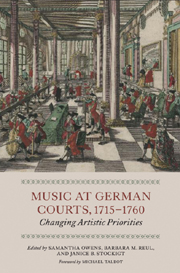Book contents
- Frontmatter
- Contents
- List of Tables
- Foreword
- Preface
- Editorial Notes
- Notes on Contributors
- List of Abbreviations
- 1 ‘Das gantze Corpus derer musicirenden Personen’: An Introduction to German Hofkapellen
- KINGDOMS AND ELECTORATES
- DUCHIES
- PRINCIPALITIES AND PRINCE-BISHOPRICS
- LANDGRAVIATES AND MARGRAVIATES
- 12 The Court of Hesse-Darmstadt
- 13 The Court of Baden-Durlach in Karlsruhe
- 14 The Court of Brandenburg-Culmbach-Bayreuth
- 15 ‘Die vornehmste Hof-Tugend’: German Musicians' Reflections on Eighteenth-Century Court Life
- Index
14 - The Court of Brandenburg-Culmbach-Bayreuth
from LANDGRAVIATES AND MARGRAVIATES
Published online by Cambridge University Press: 12 September 2012
- Frontmatter
- Contents
- List of Tables
- Foreword
- Preface
- Editorial Notes
- Notes on Contributors
- List of Abbreviations
- 1 ‘Das gantze Corpus derer musicirenden Personen’: An Introduction to German Hofkapellen
- KINGDOMS AND ELECTORATES
- DUCHIES
- PRINCIPALITIES AND PRINCE-BISHOPRICS
- LANDGRAVIATES AND MARGRAVIATES
- 12 The Court of Hesse-Darmstadt
- 13 The Court of Baden-Durlach in Karlsruhe
- 14 The Court of Brandenburg-Culmbach-Bayreuth
- 15 ‘Die vornehmste Hof-Tugend’: German Musicians' Reflections on Eighteenth-Century Court Life
- Index
Summary
ALTHOUGH STATE ARCHIVES – most importantly those in Bamberg and Berlin – continue to house a vast number of archival documents relating to the Bayreuth court, scholars who focus on the Franconian Hohenzollern residence struggle with the loss, if not the destruction, of a great many fundamental primary sources after 1801, including payments and employment records. In addition to documentation kept in Bamberg and Berlin, records are dispersed amongst civic archives and university libraries in Bayreuth and Erlangen. Of special significance are manuscripts and archival documents held by the Historischer Verein für Oberfranken, whose founding members were able to obtain significant archival sources at Plassenburg Castle in Kulmbach before the dissolution of the house archive of both Franconian Hohenzollern lines. In addition, consideration must be given to individual documents associated with related noble families that remain extant in archives and libraries in Aurich, Dresden, Harburg (Swabia), and Stuttgart.
Today, the music of the Upper Franconian town of Bayreuth is primarily associated with Richard Wagner, in particular his legendary Festspielhaus on the ‘Grüner Hügel’ and, of course, the Bayreuth Festspiele. Otherwise, Wilhelmine, the older sister of the Prussian crown prince, Friedrich (later Friedrich II, king of Prussia, sometimes called ‘Frederick the Great’; 1712–1786), who referred to her as his ‘Lieblingsschwester’ (favourite sister), comes to mind. But Bayreuth had been an important site of courtly musical life ever since the arrival of the Berlin Hohenzollern family in 1604.
- Type
- Chapter
- Information
- Music at German Courts, 1715–1760Changing Artistic Priorities, pp. 389 - 412Publisher: Boydell & BrewerPrint publication year: 2011

